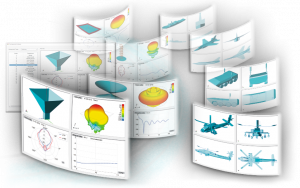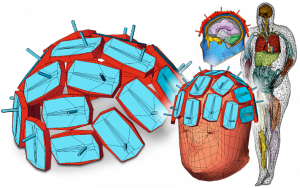We are pleased to announce the official launch of new versions of our flagship products: WIPL-D Pro CAD 2022 and WIPL‑D Pro 18. Recent releases bring enhanced user experience and numerous new features and upgrades.

WIPL-D Pro CAD 2022: What is New? – full release note

- Assembly: The new instance at the top of topological
hierarchy
- Component library, comprising:
- Simulation-ready antennas
- Platforms
- Improved import of CAD models:
- Renaming and merging of common symbols
- Merging of common domains
- New naming algorithm – increased robustness when
working with very complex models
- Improvements in the meshing algorithm:
- Extraction of poles in the pre-meshing phase
- Improved mesh when working with complex models
with a number of small faces and isolated vertices
- Blending operation
- Rolling-ball and chamfers blend
- Propagating or non-propagating blend
- Import of fully parametrized Ansys Nuhertz FilterSolutions filter models
- New options for frequency dependent materials:
- Export to an .frN file
- Show numerical values of domain parameters
- Other options/improvements:
- New functions in the symbolic mechanism
- Improvements in the Crop by Plane option when parts of a wire are placed in the cutting plane
- Characteristic Modes Analysis
- Setting of local mesh size and angular tolerances on the body level
- …

- New options in the STL Editor:
- Automatic validation
- Automatic healing (simplification and unite)
- Fully controlled decimation and quad meshing
- Export of selected model parts
- Model settings
- Manipulations
- NEVA based human phantoms for EM modeling
- Library of antennas for medical microwave imaging
- Material library with over 80 predefined materials, and
three new ways to define frequency dependent material properties:
- Frequency table
- Cole-Cole approximation
- Djordjevic-Sarkar approximation
- Operations applicable to a selection of domains:
- Near-field calculation
- Averaging of material properties
- Enhanced capabilities when importing models/projects
- New application for plotting the output results (WIPL-D graph viewer):
- Completely new algorithm for reading and processing data
- An intuitive and user-friendly setting of graph parameters
- Introduction of new variables for plotting
- Plotting different data formats on the same graph
- Save and reuse graph settings
- Other improvements: rounding numbers, faster 3D rendering using
OpenGL display lists, spline fitting, export to ASCII for overlaid results
- Extended limits of the periodic boundary condition solver
- GPU solver: accelerated GPU matrix solve for a large number of excitations
- Export and re-use of the MoM matrix
- Fast preview of large and complex structures
- Other features/improvements:
- Repair projects at open
- Reverse simulation order in frequency and sweep parallel runs
- Import of MAP files
- Enhanced limits for handling large and complex structures
- Enhanced limits for handling of structures with a large number of generators/ports
- Custom-defined merge tolerance



